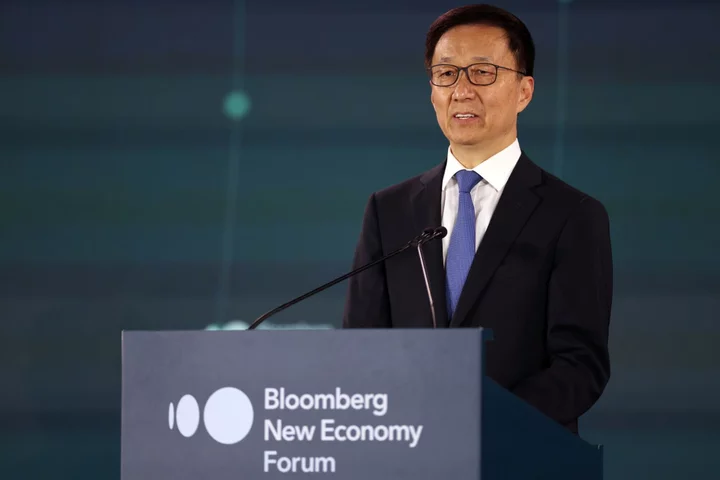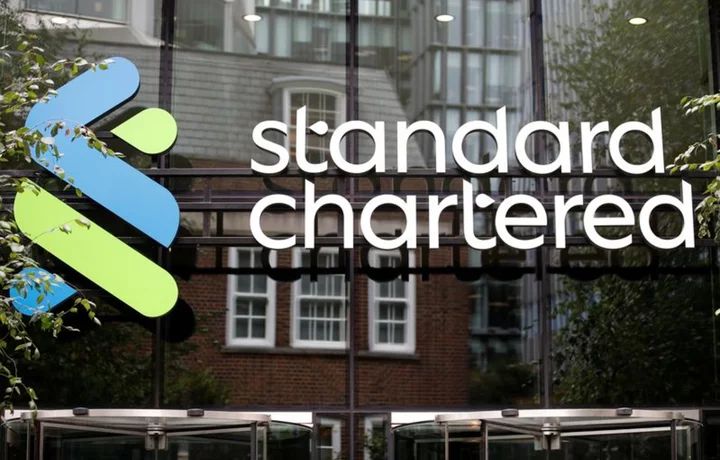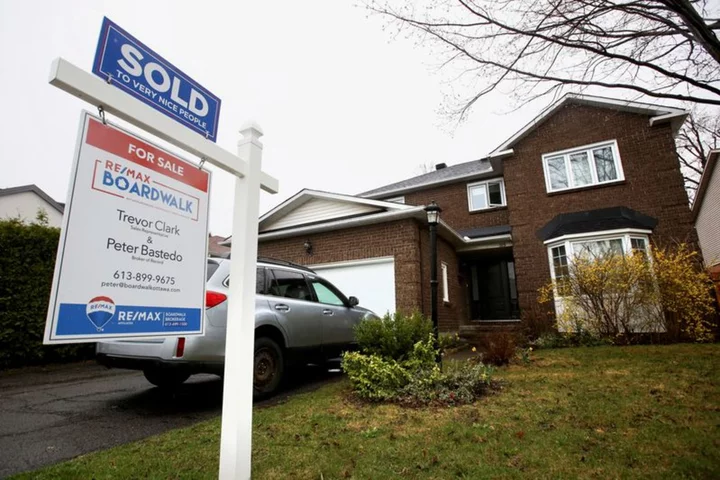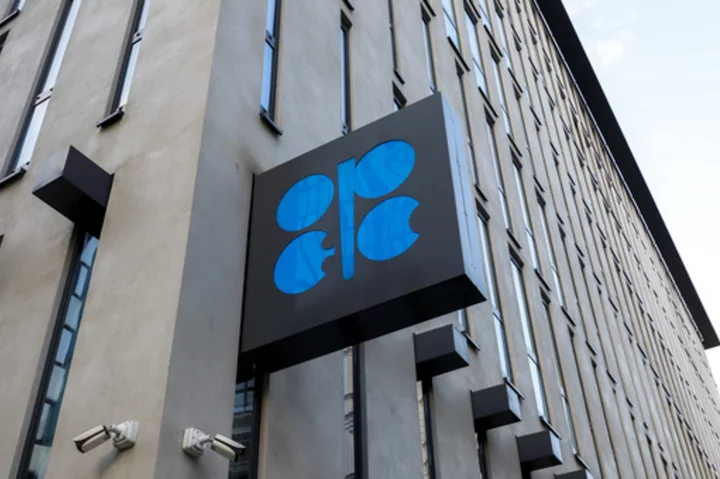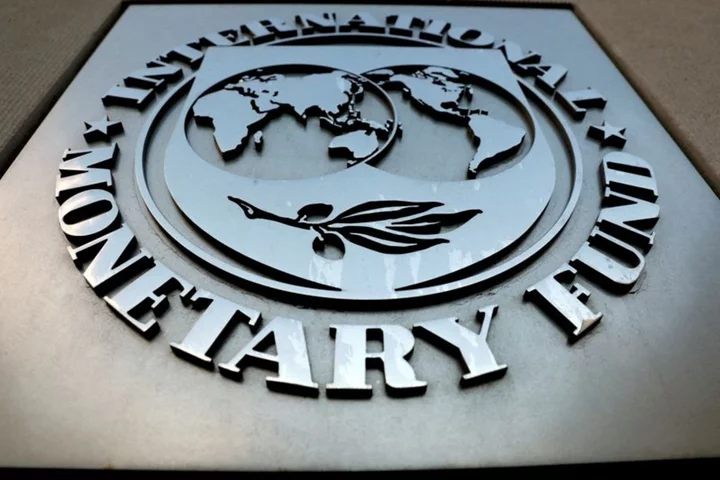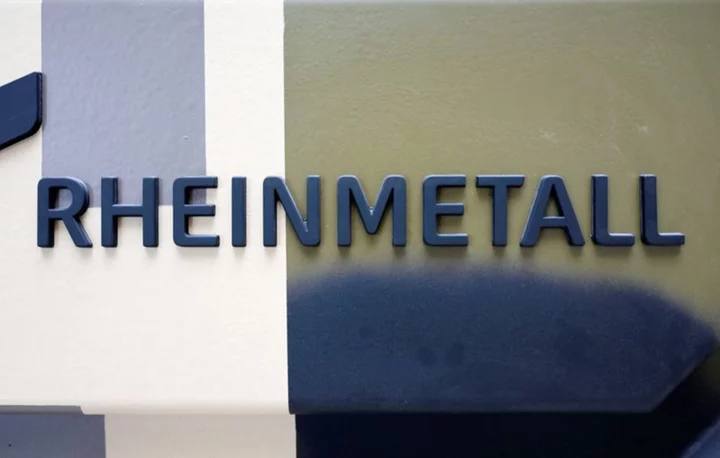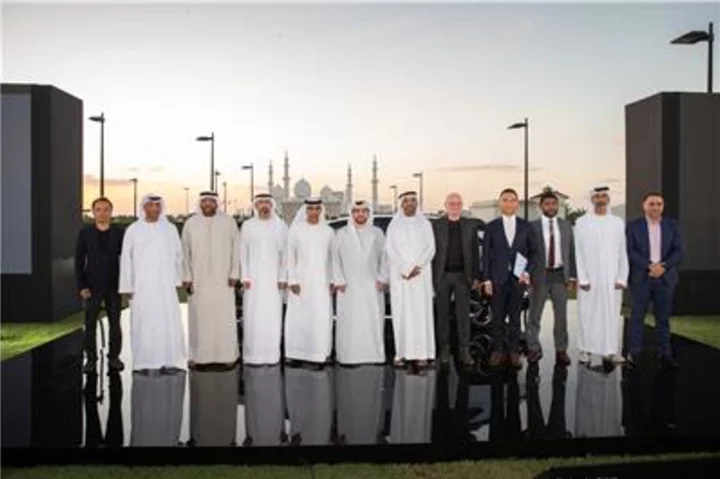Chinese Vice President Han Zheng talked up the importance of improving ties with the US, while Saudi Arabia’s Minister of Investment Khalid Al-Falih said his country plans summits to push for peace in the Middle East, as geopolitics dominated talks at the Bloomberg New Economy Forum in Singapore.
The prospects for China’s economy and the importance of reducing global tensions were key focal points, with Singapore Foreign Minister Vivian Balakrishnan warning that while there are wars in the Middle East and Europe, there are also potential flashpoints in Asia.
Other key political and business leaders speaking at the three-day forum include Citadel Chief Executive Officer Ken Griffin, and Sergio Ermotti, who recently returned as CEO of UBS Group AG. HSBC Holdings Plc CEO Noel Quinn said global efforts to remake supply chains could risk more inflation and unrest. Singapore Prime Minister Lee Hsien Loong will speak in the evening.
Singapore Sees ‘Moment of Danger’ (10:05 a.m. SGT)
The world is facing a “moment of danger” with wars in Ukraine and Gaza, along with “tripwires” that could trigger conflict in Taiwan and the South China Sea, and the same “cast of characters” on either side of those territorial disputes, Singapore’s Foreign Minister Vivian Balakrishnan said.
“I’m very uncomfortable,” he said. “I don’t want to be excessively alarmist, but the last time that happened globally was the First World War. So this is a moment of danger.”
Balakrishnan also expressed concern at the possible effect on oil prices in the event that the Gaza conflict escalates. “The real issue is that if you get a regional conflagration, and, in particular, Iran gets into the act, I think you can easily imagine the impact of this on global oil supplies and therefore the price.”
Limits to Just-in-Time (9:50 a.m. SGT)
Four factors will reshape global supply chains, HSBC CEO Quinn said, citing geopolitics; post-Covid resilience; innovation around technology and energy supply; and the changing nature of China’s economy away from manufacturing and exports toward more domestic-driven consumption.
“You put those four factors together and the world is going to change,” Quinn said. However, the shift in supply chains away from just-in-time to onshoring is going to be constrained by economic realities.
“I don’t think the world can afford even higher inflation from repapering every supply chain,” he said. “I don’t think the world can afford the social unrest that would come from that, and higher interest rates and low economic growth.”
China Must Do More (9:30 a.m. SGT)
Fred Hu, CEO of Chinese investment firm Primavera Capital, says China must deploy more measures to counteract its economic slowdown. President Xi Jinping’s government has stepped up efforts to help private companies in recent months, vowing to treat them on par with state-owned enterprises, or to seek more input from entrepreneurs on policy proposals.
“China has done a lot, but it is not enough,” he said in a Bloomberg TV interview on the sidelines of the forum. “China definitely has to do far more” to boost consumer and investor confidence, he said. Beijing’s pledges have rung hollow in many corners of the market, with foreign business groups decrying “promise fatigue” amid skepticism about whether meaningful policy support is forthcoming.
In a separate TV interview, Yuzo Kano, CEO of Japanese crypto exchange BitFlyer Holdings, called Hong Kong one of the brighter spots in digital assets. “I’m interested in Hong Kong — they are welcoming web3 companies,” he said, when asked about potential regions for expansion. The city rolled out a dedicated virtual-asset regulatory framework mid-year as it tries to restore its luster as a cutting-edge financial center.
Saudi Arabia on Middle East Crisis (9:15 a.m. SGT)
Saudi Arabia’s Al-Falih applauded the improving US-Chinese relationship, but otherwise noted that the NEF this year meets at a time of heightened crisis. Saudi Arabia is pained on a human level at the loss of life in Gaza and the losses in Israel on Oct. 7, he said.
“The Palestinian people have had their basic rights taken away and the right for statehood and peaceful existence unfulfilled and it’s time to use this awful situation to bring that to the fore and to resolve it,” Al-Falih said. Saudi Arabia will convene summits aiming for a peaceful resolution of the conflict, and said a normalization of ties with Israel is “contingent on a pathway to a peaceful resolution of the Palestinian question.”
The Gaza-based Islamist group Hamas, which is designated as a terrorist organization by the US and European Union, attacked Israel in early October, killing more than 1,400 Israelis and taking around 240 people hostage, triggering the most recent bout of fighting. The resulting war has raised widespread concerns about the civilian toll.
China Vows to Keep Opening Up (8:50 a.m. SGT)
Vice President Han, speaking days before US President Joe Biden is expected to meet Chinese leader Xi Jinping for key talks on the sidelines of the Asia-Pacific Economic Cooperation summit in San Francisco, said recent high-level meetings between both countries have raised expectations in the international community for improved ties.
Han warned against protectionism and “de-risking” trends. The world is big enough for both countries to get along, Han said, emphasizing that China remains committed to opening up and is both a supporter and beneficiary of globalization.
China’s economy is recovering on the whole, but Han said the global economic recovery lacks momentum.
Templeton on China (8:15 a.m. SGT)
Beaten-down Chinese equities may have an opportunity for gains with the possible upcoming meeting between leaders of the US and China next week, according to the chief investment officer of Templeton Global Equity Investments.
“In the very short term in China, we could have a catalyst with the potential upcoming meeting between President Biden and President Xi — with a bit of luck that happens in San Francisco next week,” Manraj Sekhon said in a Bloomberg TV interview on the sidelines of the NEF. “That could provide a temporary floor in China equities.”
US Treasury Secretary Janet Yellen and her Chinese counterpart will hold two days of talks in San Francisco this week, a step toward more normal ties ahead of a long-anticipated meeting between the leaders of the world’s two largest economies.
The NEF will also see extensive discussions about climate change, including by US Special Presidential Envoy for Climate John Kerry, along with insurers and representatives of at-risk nations such as the Maldives.
Tensions over climate change are increasing ahead of the COP28 summit that’s being hosted by the United Arab Emirates from Nov. 30, with clashes likely over emissions from developing countries, and over who should pay into a fund to address losses and damage from climate change.
The New Economy Forum is being organized by Bloomberg Media Group, a division of Bloomberg LP, the parent company of Bloomberg News.

